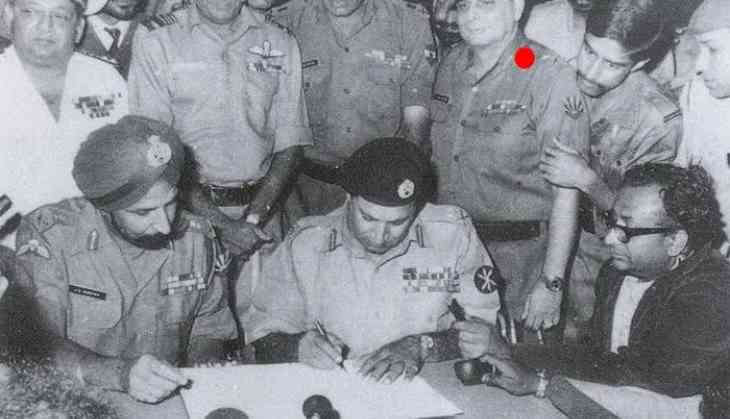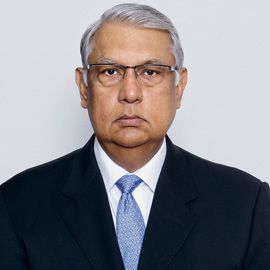Victory Day: Why the brutal 1971 war remains a unique saga in human history

On 16 December, Bangladesh celebrates “Bijoy Dibosh” (Vijay Diwas) and India marks “Victory Day”.
The day commemorates the end one of the most brutal and significant wars in the latter half of the 20th century.
On this day in 1971, Pakistan’s military forces in erstwhile East Pakistan, surrendered to the Joint Command of the Indian military and Bangladeshi freedom fighters - the “Mukti Bahini”.
Indian Army soldiers and Mukti Bahini fighters fought shoulder to shoulder in the War of Liberation. Copious amounts of Bangladeshi and Indian blood was shed, mingling with the soil and waters of the great rivers Padma and Jamuna and numerous other rivers that meander across the territory of Bangladesh, marking the delta of the Ganga-Brahmaputra river basin.
The birth of legends
1971 was an eventful year for South Asia and global geo-politics. It propelled then Indian prime minister Indira Gandhi to an unheralded height of domestic public popularity and sealed her place in history as a great statesperson.
Indian military leaders, General Sam Manekshaw, Gen Jagjit Singh Aurora, Gen JFR Jacob and Gen Sujan Singh Uban also ensured their places in history, having led the Indian Army to victory over Pakistan.
It is indeed remarkable that the three generals were a Parsi, two Sikhs and a Jew. India’s secular credentials could not have been burnished any better. General Uban’s role in raising the Gano Bahini, the irregular guerrilla force of Bengali freedom fighters, played an invaluable role in sapping the morale of the Pakistani Army through their daring acts of sabotage which tied down Pakistani units and isolated them in pockets. These generals have become the stuff of legend in the annals of Indian military history.
Sheikh Mujibur Rahman, the Bangladeshi leader who had called for independence also achieved immortality. He was named “Bangabandhu” (friend of the Bengalis) and father of the nation in Bangladesh.
Later, both leaders marred their legacies – Indira Gandhi by the imposition of Emergency and Mujibur Rahman by inept administration in a war-torn economy and imposition of one-party rule. Both leaders fell to assassins’ bullets – Mujibur Rahman and the majority of his family, in August 1975 and Indira Gandhi in October 1984.
The mantle of leadership of the Congress party passed on to Rajiv Gandhi, Indira Gandhi’s elder son. In Bangladesh, the current Prime Minister, Sheikh Hasina, one of two surviving children – the other is her sister Sheikh Rehana - inherited the mantle of leadership of the Awami League.
The snowball effect
Though the conflict began within East Pakistan in March 1971, the struggle for Bengali identity and autonomy started soon after partition. The language movement was the seed which was planted in the early 1950s. This matured later into various other political demands by the Awami League, including the famous 6-point movement for political and financial autonomy for East Pakistan, as part of a federal polity.
The armed conflict in 1971 quickly snowballed into a regional and global issue, when the Cold War was still at its peak. The Republican administration of president Richard Nixon and his infamous adviser, Henry Kissinger, lined up the US against India in support of Pakistan. The genocidal military dictator, General Yahya Khan was the president and chief martial law administrator, who ordered the bloody crackdown in East Pakistan.
This led to Mujibur Rahman declaring independence and announcing the new nation of Bangladesh on 26 March 1971, now celebrated as Bangladesh’s Independence Day.
In a classic manouevre of Cold War geo-politics, India entered into a Treaty of Friendship and Cooperation, which helped the Soviet Union come out in support of India in the 1971 War. Kissinger later said on record that the US was focussed on the rapprochement with China which was facilitated by Pakistan and hence the support for Pakistan. Kissinger also tried to help Pakistan by encouraging China to attack India during the war to ease pressure on Pakistan. China did not fall into his trap.
Kissinger justified his role in supporting Pakistan’s genocidal behaviour in the light of a bigger and more existential struggle of the Cold War. It is, however, another irony of geo-politics that the Republican Administration headed by President George Bush chose to accomplish the Nuclear Deal with India. International politics is never static and the current international order is being buffeted by another transition, as China seeks regional and global hegemony, leading to re-alignments in the global order.
A brutal narrative
The brutal Pakistani crackdown led to the flight of over 10 million refugees into India, 90% of them Hindus. Pakistan and its collaborators targeted the Hindu population of East Pakistan. The Pakistani narrative even today remains in the fantasy land that believes that Bangladesh was a creation of Hindu conspiracy. Pakistan's elitist feudal mindset seems to still suffer from the delusion that they are the inheritors of Muslim rule in India.
Their attitude towards their Bengali Muslim brethren and fellow citizens was marked by arrogance, disdain and a superiority complex that bordered on the ridiculous. When Pakistani soldiers and their collaborators were raping Bengali women, they referred to their heinous acts as improving the DNA of the Bengalis.
On the eve of liberation, the Pakistan Army rounded up leading intellectuals in Dhaka and after torturing they dumped their bodies at Rayerbazaar and Mirpur near Dhaka on 14 December 1971, two days before they surrendered. Bangladesh remembers its martyred intellectuals every year on this day at an impressive memorial at Rayerbazaar, built on the site where most of the bodies were dumped.
Such was the viciousness and vengeful attitude of the Pakistan towards its fellow Bengali Muslims.
The Pakistani military and their local collaborators, drawn from ranks of Bihari Muslim migrants and die-hard Bengali Islamists members of the Jamaat-i-Islami, had created local militias called the Razakars.
This name harks back to the liberation of Hyderabad in India wherein the ruler known as the Nizam raised the Razakars, an armed militia, from among the Muslim inhabitants. The Razakars became notorious for their brutality in suppressing the aspiration for freedom among the people who strongly wished reunite with the India.
To suppress the local inhabitants, the Razakars killed, tortured, looted and raped, mainly Hindus. The Pakistani Army was no doubt inspired by this example. It created local militias using names like Al-Badr and As-Shams to torture kill loot and rape the rebellious Bengali population. The names of these militias are drawn from Islamic history and were used to incite feeling of Muslims.
A unique saga
Hyderabad was one of the largest Princely states in India and was ruled by the Nizam. When the British partitioned India, there were around 565 princely states scattered all over undivided India. The Princely states were given the option of joining either India or Pakistan.
Most Hindu rulers of these states chose to join the Indian union, but some Muslim rulers, like the Nizam, motivated by misguided Islamic zeal, chose to join Pakistan. Rarely has there been and an act of such utmost geo-political stupidity in recent history and met its inevitable end when the Indian Army ensured that Hyderabad was incorporated into the territory of India.
After nine months of a bloody armed struggle and Indian military intervention, Bangladesh was born as an independent country. It must be remembered that many Bengali Muslims of then East Pakistan were not in favour of seceding from Pakistan, in deference to the Islamic ideal of not breaking up the Umma. This latent feeling was to later play a seminal role in Bangladesh’s fractured politics, after the assassination of the Bangabandhu when pro-Islamic and pro-Pakistani feelings re-surfaced.
These feelings were encouraged by military dictators, trained in the Pakistani establishments who were bent upon retaining power using methods honed by Pakistani military dictators.
The Hamoodur Rahman Commission which went into the causes of the 1971 debacle has been suppressed by every Pakistani government. From selected leaks and other sources, the Commission squarely blamed the Pakistan Army for losing half the country.
The War of Liberation, as it is called in Bangladesh, will remain a unique saga in human history. It was Bengali nationalism trumping Islamic nationalism and the two-nation theory that led to the partition of India.
First published: 15 December 2017, 21:40 IST

